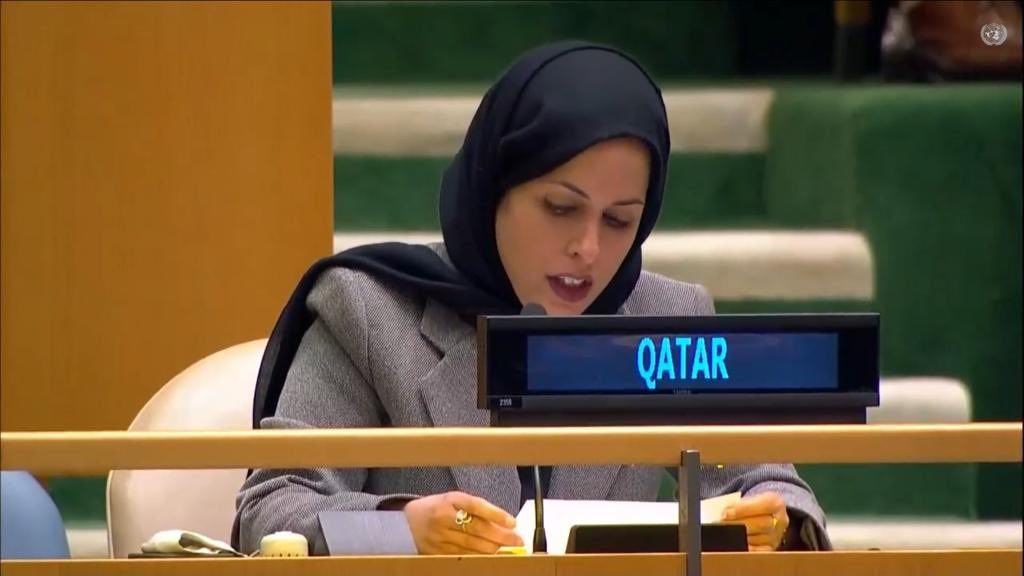Qatar confirmed its keenness to support human rights through contributing to international efforts, a Qatari official said in a statement.
Qatar reiterated its commitment to international efforts to achieve comprehensive and sustainable development, an official source said on Sunday.
In a statement on the sidelines of the 76th session of the United Nations General Assembly, Qatar’s Permanent Representative to the United Nations, Ambassador Sheikha Alya Ahmed bin Saif Al-Thani, stressed the Gulf state’s pivotal role in supporting countries and international organisations in combating the ongoing coronavirus pandemic.
The meeting focused on international efforts towards sustainable development while countries worldwide fought against the pandemic.
The ambassador highlighted her country’s keenness to implement measures in the wake of the health crisis, “within a perspective that respects and promotes the human rights of citizens and residents in the State of Qatar alike, focusing on the groups most affected by the pandemic and its consequences, including the elderly, women, children, and persons with disabilities,” the Ministry of Foreign Affairs said in a statement on Sunday.
It added that Qatar provided over USD140 million in 2020 in response to the health crisis and its repercussions, including providing equitable access to vaccines, especially in disadvantaged countries.
The Qatari representative also outlined the Gulf state’s extensive efforts in providing all citizens and residents, including migrant workers, access to vaccination, occupational health conditions and established control and accountability systems for employers.
Qatar’s response to the COVID-19 pandemic was recognised globally. According to Our World in Data, it recently ranked the second country globally with the highest percentage of the eligible population who received at least the first dose of the Covid-19 vaccine.
Read also: Qatar ranks second worldwide for rate of first Covid-19 vaccine dose
According to the latest statistics published by the online publication, the Gulf state also ranked fifth in the world for the highest fully vaccinated population among countries with over one million residents, which compiles Covid-19 vaccination data from around the world.
Moreover, the Qatari ambassador noted Qatar’s response to women’s special needs, characterised mainly by the recently approved draft decision on a part-time system in government entities.
This move is set to empower working women by providing more flexibility at work to balance work and family responsibilities.
The latest amendment comes under the item of social development on “preparations for the celebration of the 30th anniversary of the International Year of the Family in 2024,” through which Qatar promotes consultations on behalf of the Group of 77 and China.
During the meeting, Doha urged implementing the General Assembly resolution 75/275, entitled “International Day of Women Judges”, as the Gulf state aspires to revive the first International Day of Women Judges on March 10, 2022.
This is expected to facilitate the full participation of women at all levels of the judiciary on an equal basis with men.
Read also: UN official ‘welcomes’ Qatar’s generosity in besieged Gaza
“On this occasion, the statement called on member states to support the draft resolution submitted by the State of Qatar, Brazil and Spain under the item of social development on “dealing with the challenges faced by people with rare diseases and their families,” MoFA said.
Ambassador Sheikha Alya expressed aspiration to launch the UN House in Doha soon. She states it “will house the offices of many UN bodies and make it the capital of international multilateral action in the region, including a UNICEF office, and a centre for analysis and communication of the Office of the Special Representative of the Secretary-General for Children and Armed Conflict,” according to MoFA.
In addition, the Gulf state renewed its commitment to support the United Nations Center for Training and Documentation in the Field of Human Rights for Southwest Asia and the Arab Region established by General Assembly Resolution No. 60/153 of December 16, 2005.
It also called on member states “to support the draft resolution on the centre submitted to the Committee,” a statement read.







